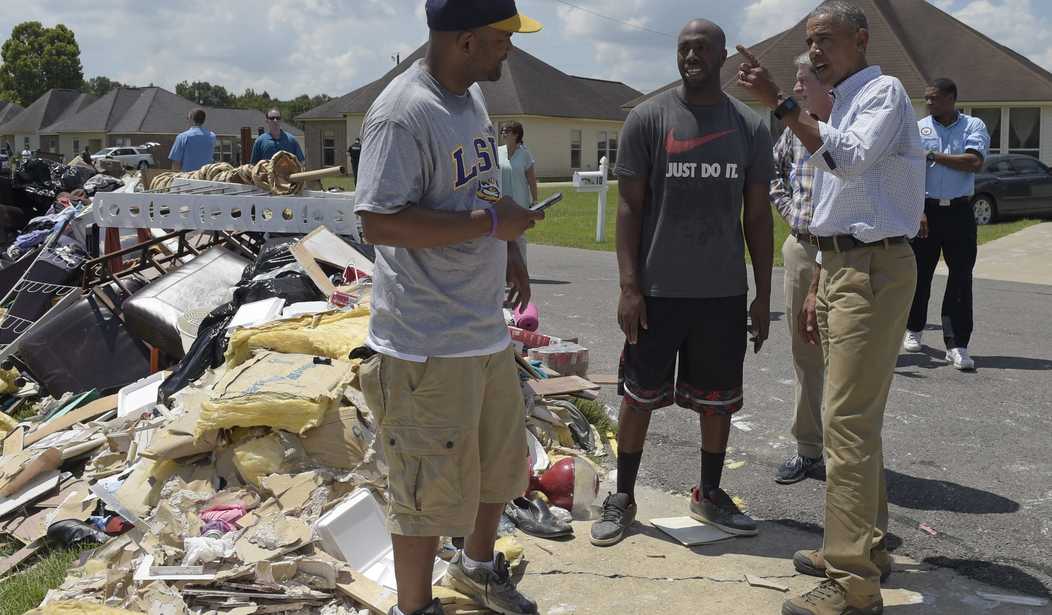Republican Louisiana Rep. Kenny Havard wants the state’s congressional delegation to push for federal tax law changes to allow people whose homes have been damaged by the Great Flood of 2016 to use their retirement accounts to help pay for repairs.
Louisiana is dealing with what Brad Kieserman, an American Red Cross vice president, called the “worst natural disaster to hit the U.S. since Super Storm Sandy.”
Kieserman said more than 110,000 homes have been damaged or destroyed.
“[The flood] has changed countless lives forever,” said Kieserman. “The situation in Louisiana remains critical. People need help, and they need it now.”
They are the people who Rep. Havard said may need to tap into their 401k and other retirement accounts without facing financial or tax penalties.
“I just believe this is the Louisiana way,” he said. “When we can, we take care of ourselves. A lot of our folks are hurting, and it just doesn’t make sense to me to penalize individuals for using their own money to help themselves in such a once-in-a-lifetime emergency.”
Just as the tens of thousands of people in Louisiana whom Kieserman and Havard are worried about work to put their lives back together, state officials are also trying to find tens millions of dollars in an already tapped-out state budget to repair roads, sewer systems, and other infrastructure.
Louisiana’s budget is as tight as anyone’s in the state.
After a stormy 19 weeks of a special legislative session, an estimated $2 billion budget deficit was all but eliminated only by cutting spending, raising sales and cigarettes taxes, and approving a few other revenue-generating measures.
However, the Advocate reported Gov. John Bel Edwards declared he will not call another special legislative session to deal with recovery from the flood.
And he has promised, “The fiscal condition of this state is not going to limit what we do to make sure that people get the assistance they need.”
Still, it won’t be easy.
Jay Dardenne, Louisiana’s commissioner of administration, is in charge of day-to-day operations of state movement and creating solutions to budget problems.
Dardenne told legislators Aug. 18 he, and they, had an enormous challenge ahead of them. As many problems as Louisiana may have faced before it started raining, he stressed, recovering from the Flood of 2016 will take most, if not all, of their time.
“I think your term has now changed, and your life has now changed for the balance of the years you are here,” the Times-Picayune reported Dardenne said to legislators during a financial meeting.
Just the National Guard cost Louisiana $800,000 a day during the first six days of the flood. State officials put the total cost estimate at $12.5 million, with more bills expected to add to that number as recovery efforts continue.
Sen. Conrad Appel (R) was not as optimistic as Gov. Edwards about being able to help everyone who needs assistance in Louisiana.
Before the storm hit, state officials were thinking about taking out a short-term loan to make ends meet in the fall.
And then came the flood.
Jan Moller, director of the Louisiana Budget Project, a public interest group, said the state could have another $200 million budget deficit by January.
“I just don’t know where he is getting the money,” Appel said following the meeting, at which Dardenne warned recovering from the storm would be the state’s top priority for several years to come.
Mark Zandi, chief economist for Moody’s Analytics, agreed the Flood of 2016 could make Louisiana’s budget problems even worse.
“Community centers, schools, even emergency responders and hospitals, those are under tremendous strains,” Zandi told CNN. “There will be much less state help forthcoming.”
Repairing infrastructure and helping people survive day to day could be just the beginning of the aftermath of the flood.
Louisiana’s budget problems will only get worse if people, and their tax dollars, start moving out of the state.
Louisiana lost 6 percent of its population after hurricanes Katrina and Rita. Nobody is forecasting an exodus on that scale after these floodwaters recede.
But Ginger Maulden, the president-elect of the Greater Baton Rouge Association of Realtors, told CNN losing more than 60,000 homes to the flood will make an already tight housing market even worse. Baton Rouge-area residents may have no other option but to move.
Making the situation even worse is the number of small businesses ruined by the flood.
“A number of businesses are not rebuilding at all,” she said. “People are going to have to relocate to find work and feed their families.”
Even with all those problems looming over Louisiana, state Sen. Jonathan Perry is already facing the reality of life on the Gulf Coast. He’s preparing for the next storm.
Perry wants to formalize the “Cajun Navy,” the volunteers who have been using their boats to rescue people from rising floodwaters in Louisiana.
The Republican told KPEL he wants to make sure Cajun Navy boaters take safe-boating courses to take away any excuse a state bureaucrat might create for dry docking a volunteer.
“At the end of the day, there are going to be two things that are going to be the hurdle when you approach it from the state’s standpoint,” said Perry. “Liability is going to be number one for them. They don’t want the liability of someone going out to rescue someone and then not being able to find them (the rescuers) and, secondly, there’s a cost.”
But Kevin Boyd, the senior correspondent for the Hayride, wrote that while Sen. Perry’s intentions may be honorable, the last thing the Cajun Navy needs is a politician getting in its way.
“The easier solution is to get rid of state employees who are incapable of using common sense. State employees who are more worried about liability than rescuing people from rising flood waters shouldn’t be working as rescuers,” Boyd wrote.
“One of the best things about the ‘Cajun Navy’ is that they didn’t need the government to put them together and coordinate everything,” Boyd added. “It was a real life example of spontaneous order. The last thing we need is do-gooder legislators inserting government where it is not needed.”








Join the conversation as a VIP Member